Signs that your commercial air conditioning isn’t working properly
Excluding the obvious reasons why your air conditioning isn’t working, such as no cool air coming out or your system isn’t turning on, there are some other tell-tale signs you should be looking out for.
Thermostat issues
Sometimes the thermostat causes unwanted complications.
One way to check whether your thermostat is the culprit for any issues is to check whether one part of the premises is cold while another part remains at the same temperature. Another sign is when you have your heating, ventilation and air conditioning (HVAC) set for around 21 degrees Celsius, but it’s about 6 degrees off.
Moisture or leakage
If there are any leaks or moisture coming from your air conditioning system, it’s either one of two things:
- The leak is refrigerant – an AC refrigerant leak is caused by holes or cracks in the coils that circulate the refrigerant. It’ll often make a hissing sound. If untreated, it can cause serious health risks.
- Water pools – if there are water pools adjacent to your AC, this usually means the drain tube which disposes of the AC condensation is either blocked or broken. Although this isn’t as serious as a refrigerant issue, it should be fixed quickly to avoid the build-up of mould and rust.
Strange sounds or odours
Your senses are a good indicator as to whether your air conditioning is functioning at an optimum level or not.
Any squealing or grinding sounds coming from your commercial air conditioning implies that something is wrong inside the unit. A squealing sound is the most common bad sound, which suggests that a metal component inside your AC unit needs lubricating, while a grinding noise means the bearings are broken.
If your smell senses are being called into action due to a pungent scent, this signifies that the wire insulation has burned out inside your air conditioner. Whereas a musty, foul smell points towards a build-up of mould inside your ductwork/air conditioning pipes.
Electricity bill is through the roof
HVAC is one of the most expensive overheads for a business. If you notice an unusually high bill compared to a previous month, your air conditioning unit probably isn’t working efficiently. This is where it’s important to regularly service and clean the unit.
Poor airflow
If you’re noticing weak or little airflow through the AC vents, the unit’s compressor might have packed in. However, if you find certain areas of an office or room is getting cold while others aren’t, then there’s a high probability that the ductwork is experiencing problems – i.e. your air conditioning pipework. In which case, you should call an expert to remedy the issue immediately to prevent further damage to the commercial air conditioning system.
Another reason why there’s a poor airflow coming from your AC is due to the build-up of debris in the vents. Not only does this obstruct the airflow, but it also can create a health risk to your employees too.



